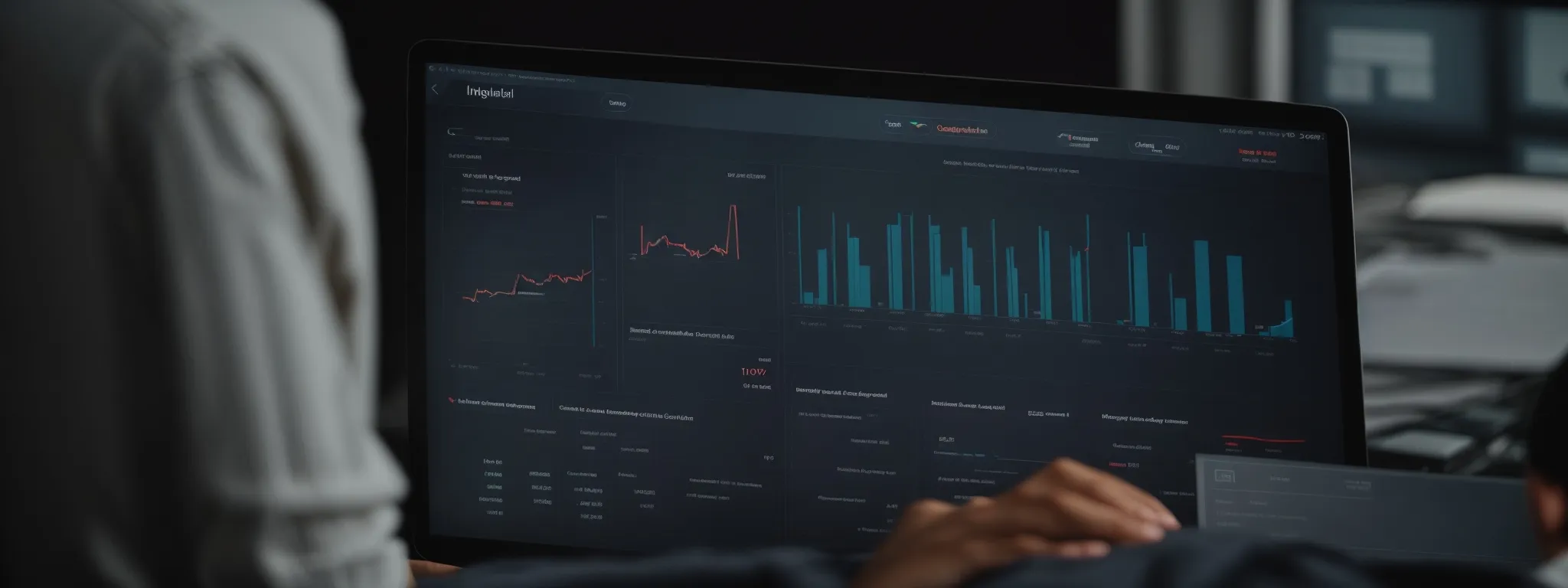B2B Search Marketing
Mastering B2B Search Marketing: Strategies for Business Growth In the rapidly evolving digital landscape, mastering B2B search marketing emerges as a critical component for business growth, where […]
Mastering B2B Search Marketing: Strategies for Business Growth
In the rapidly evolving digital landscape, mastering B2B search marketing emerges as a critical component for business growth, where traditional marketing tactics alone no longer suffice.
Faced with the complexity of reaching b2b customers, who often embark on a nuanced purchasing journey, companies must refine their digital marketing plan, harnessing cutting-edge tools and strategies to optimize their online presence.
Tailoring efforts to meet the specific needs and search behaviors of b2b buyers, while navigating the ever-changing algorithms of search engines, is where the prowess of an expert like LinkGraph comes into play, offering SEO services and tools that are pivotal for success.
Organizations aiming to propel their digital strategy forward and generate meaningful web traffic must commit to a well-formulated b2b search marketing blueprint.
Discover an array of insights and strategies that enable businesses to achieve this by delving into LinkGraph’s comprehensive approach to B2B search marketing.
Key Takeaways
- B2B Search Marketing Is Essential for Engaging Potential Buyers and Building Long-Term Relationships
- Strategic Keyword Research and on-Site SEO Are Crucial for Optimizing B2B Web Presence and Authority
- Utilizing Tools Like LinkGraph’s Search Atlas SEO Software Is Key for Effective Keyword Targeting and Competition Analysis
- Link Building and Maintaining Accurate Local Business Listings Are Vital for Boosting Domain Authority and Local SEO
- Analyzing Performance Metrics With Advanced Tools Helps Refine B2B Search Marketing Strategies for Better ROI
Understanding B2B Search Marketing Fundamentals

In the arena of digital strategies where competition thrives, B2B search marketing emerges as a pivotal component for b2b businesses eager to amplify their digital presence and forge meaningful connections with their target audience.
Distinct from the consumer-focused tactics prevalent in B2C marketing, B2B search marketing channels a nuanced understanding of the intricate purchase decisions and elongated sales cycles typical among b2b buyers.
This subset of search engine marketing encompasses a multitude of facets ranging from comprehensively optimized landing pages to data-driven content marketing, all meticulously tailored to resonate with b2b customer needs and pain points.
A cogent exploration of this domain is not just beneficial but critical for any b2b company or marketer poised to excel in digital marketing and lead generation endeavors.
Define B2B Search Marketing and Its Importance
B2B search marketing is the practice of positioning a company’s digital assets to effectively attract and engage potential b2b buyers through search engines. It is an integral part of a comprehensive digital marketing plan, marrying the nuance of b2b relationships with the precision of SEO and paid search strategies.
Recognizing the importance of B2B search marketing is central to grasping its impact on a business’s bottom line: Executing tailored strategies elevates brand awareness, drives web traffic, and converts high-quality leads, serving as the backbone of successful b2b digital campaigns:
| Marketing Aspect | Role in B2B Search Marketing |
|---|---|
| SEO | Optimizes web content for better visibility in search engine results pages (SERPs) |
| Paid Search | Enhances immediate visibility and targets specific buyer personas |
| Content Marketing | Engages and educates potential clients, nurturing leads through the sales funnel |
Differences Between B2B and B2C Search Marketing
The digital landscapes of B2B and B2C search marketing are distinguished by their distinct target audiences and marketing objectives. B2B search marketing targets specific decision-makers within businesses, emphasizing the cultivation of long-term relationships and demonstrating value across a typically extended sales cycle, whereas B2C focuses on immediate consumer needs, aiming to capture the interest of individuals for quick purchasing decisions.
Additionally, B2B search marketing leverages content that addresses a narrow range of professional pain points and often requires a multi-channel approach that encompasses expert thought leadership, thorough report analyses, and Strategic Partnership With Influencers to foster trust and credibility among a specialized audience. Conversely, B2C marketing often prioritizes emotional engagement through persuasive advertisements, engaging social media campaigns, and easy-to-consume video content aimed at attracting a broader customer base.
Key Components of B2B Search Marketing
Anchoring B2B search marketing efforts with a granular SEO strategy ensures that each element of a company’s web presence is geared towards high search engine visibility and user engagement: A meticulously crafted approach includes in-depth keyword research, on-page and off-page optimization, and regular analysis of search trends and algorithm updates. Fundamentally, SEO for B2B not only increases the visibility of a b2b website but also underscores the relevance and authority of its content within its specific industry niche.
- Keyword Research and Targeting: Identifying the vocabulary of the target market to tailor content.
- On-page & Off-page Optimization: Harmonizing website elements with backlink strategies to bolster domain authority.
- Analytics and Search Trends: Utilizing data to adapt and refine SEO tactics for enduring relevance.
Integral to B2B search marketing is the implementation of adept search advertising through paid search campaigns: In collaboration with compelling creative and precise targeting, PPC (pay-per-click) enables a business to position its offerings directly before its chosen B2B audience, providing a prompt lift in brand visibility and web traffic while complementing organic efforts.
How to Research and Select Target Keywords

Embarking on the journey of B2B search marketing demands a tactful approach to keyword research, where identifying relevant keywords becomes the lifeblood of a well-oiled SEO campaign.
For businesses aiming to capture the attention of b2b buyers, harnessing the right tools for keyword research and analysis is essential.
A strategic tiering of keyword targeting, prioritizing terms aligned with buyer intent and industry specificity, enables companies to forge a path to prominence within their targeted search engine results pages.
Crafting an SEO strategy with precision requires not only recognizing what potential clients are searching for but also anticipating the terms that guide them through their decision-making process, a skill that is essential for any b2b digital marketing plan poised for success.
Identifying Relevant Keywords for B2B Businesses
In discerning the most impactful keywords for a B2B business, it is critical for digital marketing strategists to delve beyond high-volume search terms and tap into those that reflect the nuanced language and sophisticated challenges of their target market. LinkGraph’s Suite of Tools, including their acclaimed Search Atlas SEO software, furnishes marketers with the insights to identify the nexus of industry-specific vernacular and the search queries of their b2b audience.
The caliber of a B2B keyword selection can dramatically alter the trajectory of a company’s digital marketing campaigns. Employing a robust research methodology, LinkGraph enables its clients to distill a potent mix of keywords that not only cater to the search intent of b2b buyers but also align seamlessly with the overarching goals of their SEO strategy, bolstering both visibility and engagement in a competitive digital landscape.
Tools for Keyword Research and Analysis
When undertaking the task of B2B keyword research, it’s essential that businesses employ a selection of sophisticated tools that provide the analytics and insights necessary for impactful SEO. LinkGraph’s Search Atlas SEO software stands out in this regard, offering a refined platform through which marketers can analyze keyword effectiveness, track search volume, and gain clarity on competitive keywords within their specific industry niche.
Search Atlas not only assists in identifying high-value keywords but also offers the critical ability to monitor the evolving landscape of search engine algorithms, ensuring that digital marketers can Optimize Their Content with up-to-date practices. This strategic application of advanced tools is instrumental in fine-tuning SEO efforts, facilitating superior SERP positioning, and enhancing visibility among a target market of B2B buyers and decision-makers.
Strategies to Prioritize Keyword Targeting
Prioritization in keyword targeting is fundamental: One must weigh the potential return on investment that each keyword holds. The higher the relevance and specificity of a keyword to a b2b audience, the greater its ability to attract an audience inclined towards making informed B2B purchase decisions.
By leveraging tools such as LinkGraph’s Search Atlas, businesses can strategize their keyword targeting by focusing on search terms that not only have sufficient search volume but also lack overwhelming competition from established players in their industry:
- Assess keyword difficulty to prioritize achievable targets that balance competition and search volume.
- Identify long-tail keywords that align with the detailed queries of B2B buyers.
- Analyze search intent to ensure alignment with the content and services offered.
Optimizing Your B2B Website for Search Engines

Embarking on an effective B2B search marketing journey demands more than mere presence on the digital grid; it calls for a sophisticated blend of strategic finesse and technical prowess.
A b2b website must serve as not only a digital storefront but also a beacon, guiding the search engine’s discerning algorithms to its authoritative and relevant content.
Here lies the crux of on-site SEO, the foundation from which businesses craft search-engine-friendly content and adhere to technical best practices.
Delving into the intricacies of on-site SEO, from crafting content that resonates with both search engines and b2b customers, to ensuring a technically sound website, outlines the intricate blueprint for propelling a B2B brand to the forefront of its industry’s digital landscape.
The Role of on-Site SEO in B2B Search Marketing
The pivotal role of on-site SEO in B2B search marketing cannot be overstated; it serves as the cornerstone for ensuring that the digital footprint of a B2B marketer resonates with both search engines and the nuanced requirements of B2B customers. It’s this harmonization of technical excellence and content relevancy that positions a B2B website not just as information but as a resource, thus improving search engine rankings and captivating a specialized audience.
For B2B companies, implementing robust On-Site SEO Strategies translates into crafting a user-centric experience, where every landing page, blog post, and digital asset is calibrated for maximum search engine visibility. This optimization directly impacts a B2B organization’s ability to manifest as the go-to option in its industry niche, critically affecting its ability to generate quality leads and enter meaningful customer dialogues.
Strategies for Creating Search Engine-Friendly Content
Mastering the craft of producing search engine-friendly content commences with a profound understanding of the target audience: B2B companies must produce materials that not only address industry-specific issues and challenges but also adhere to the nuances of SEO best practices. Each piece of content, whether a comprehensive report, compelling blog post, or informative newsletter, should integrate strategic keywords seamlessly to harness the power of search marketing and galvanize visitor engagement.
| Content Type | Strategic Keyword Integration | Visitor Engagement Goal |
|---|---|---|
| Report | Industry-specific terminology | Educate and nurture B2B clientele |
| Blog Post | Trending topics and pain point solutions | Build brand authority and thought leadership |
| Newsletter | Tailored brand messaging with call-to-actions | Stimulate direct engagement and foster relations |
The coupling of engaging content with a meticulous approach to on-page optimization ensures a superior user experience that caters to both the searcher and the search engines’ algorithms. Through the strategic placement of meta tags, headings, and alt text that echo the core messaging of the B2B brand, organizations construct a powerful digital framework that enhances search visibility and propels their marketing efforts towards tangible conversions.
Technical SEO Checklist for B2B Websites
A B2B website must be structured with technical SEO integrity to ensure search engines can crawl and index its pages accurately, a pivotal step for businesses looking to gain an edge in the digital marketplace. LinkGraph’s SEO Services exert a critical focus on enhancing website infrastructure, from improving site speed to securing data with HTTPS, tailoring every technical element to align with the algorithms that govern online searchability.
Ensuring mobile responsiveness stands as a non-negotiable directive in today’s device-diverse market, with LinkGraph’s digital marketing experts advocating for a seamless user experience across all platforms to boost search engine rankings and cater to the convenience of B2B buyers on the go. The implementation of schema markup by LinkGraph’s SEO professionals serves to further clarify the context of website content, thereby enriching the communication with search engines and aiding the precise targeting of a B2B company’s niche audience.
Creating a B2B Content Marketing Plan

As businesses navigate the complexities of fortifying their presence in a digital ecosystem, a meticulously conceived B2B content marketing plan remains a linchpin in the quest to educate, engage, and convert potential clients.
Carefully crafted content marketing strategies are indispensable for B2B enterprises, offering a medium through which intricate business solutions and thought leadership can be conveyed effectively to a discerning b2b audience.
Steps for developing a B2B content strategy, crafting types of content that deeply resonate with B2B audiences, and deploying rigorous methods to Measure the Effectiveness of content marketing efforts are fundamental in carving a competitive edge and driving business growth.
Steps for Developing a B2B Content Strategy
Embarking on the creation of a B2B content strategy necessitates a rigorous understanding of the target B2B audience, uncovering the specific informational needs and pain points of decision-makers. It begins with comprehensive market research, enabling businesses to align their content with the interests and behaviors of b2b buyers, setting the stage for genuinely impactful marketing communication.
Subsequent to recognizing the audience’s core requirements, the strategy must focus on the development of a unique voice and messaging framework that reflects the organization’s values and differentiators. Intertwining this messaging with SEO practices, the B2B content strategy should strive for a balance between technical optimization and personalization that spurs the interest of both search engines and the human professionals who influence b2b purchase decisions.
Types of Content That Resonate With B2B Audiences
Whitepapers and case studies are indispensable tools in the B2B marketer’s arsenal, offering the depth and detail required to engage b2b buyers who are seeking to make well-informed decisions. These formats not only showcase a company’s expertise but also provide tangible proof of the value their products or services offer, presenting complex data and nuanced solutions in a clear, digestible manner that establishes trust and underlines capability.
Webinars and instructional videos cater to the growing appetite for visual and interactive content among B2B audiences, facilitating real-time communication and demonstration of a company’s offerings. This type of content enables B2B marketers to connect with their audience on a more personal level, allowing experts to elucidate various topics and offer insights, thereby reinforcing the organization’s stature as a thought leader within its industry.
Measuring the Effectiveness of Your Content Marketing Efforts
To gauge the success of a B2B content marketing plan, one must measure the tangible outcomes it generates against set objectives. Essential metrics include lead generation figures, the degree of engagement on published content, and the conversion rates from content-driven marketing efforts, providing clear indicators of the campaign’s performance.
Quantifying the return on investment (ROI) of content marketing initiatives is instrumental in validating their efficacy and guiding future strategy. LinkGraph’s advanced analytics tools empower clients to capture and analyze this data, ensuring each piece of content contributes meaningfully to overarching business goals:
- Tracking user behavior and engagement levels to understand content resonance.
- Monitoring lead quality and conversion rates to assess content’s role in the sales process.
- Evaluating overall ROI to make informed decisions on further content development and allocation of resources.
Leveraging Link Building for B2B Growth

In the digital sphere where authority and credibility dictate market leadership, link building emerges as a critical facet for bolstering B2B search marketing initiatives.
Strategic link acquisition for B2B sites goes beyond mere quantity—it’s a testament to trust and industry relevance, often influencing the search engine optimization outcomes significantly.
Professionals within the B2B sector must leverage proven tactics that not only enhance the impact of backlinks on B2B SEO but also embed long-term relationship-building into the process, crafting a foundation for sustainable link acquisition and growth.
Understanding the Impact of Backlinks on B2B SEO
In the arsenal of B2B search engine optimization, backlinks serve as endorsements, signaling to search engines that other entities validate the website’s content and authority. A carefully curated collection of backlinks from reputable and relevant sources can significantly amplify the domain authority of a B2B website, thereby boosting its position in the search engine results pages (SERPs).
Harnessing the power of these digital nods can lead to enhanced visibility and credibility in a crowded online marketplace, compelling search engines to give preference to a B2B brand’s content over that of competitors, especially those targeting similar keywords and audiences:
| Backlink Attribute | Benefit to B2B SEO |
|---|---|
| Reputable Sources | Elevates Domain Authority |
| Relevant Backlinks | Strengthens Relevance in SERPs |
| Targeted Keywords | Improves Visibility for Specific Queries |
Proven Link Building Tactics for B2B Sites
To actualize B2B growth through link building, one proven tactic is guest posting on reputable industry websites. This effort aligns with creating high-quality content that offers value to readers, subsequently earning a place for a company’s backlinks on these authoritative platforms.
Another effective tactic entails leveraging the symbiotic relationships between businesses by collaborating on case studies or reports: This not only showcases partnership strength but also provides a mutually beneficial context for link exchange.
| Link Building Strategy | Benefits | Suitable for |
|---|---|---|
| Guest Posting | Access to established audience, authority building | Companies with valuable insights and content |
| Collaborative Content | Shared promotion, expanded reach | Businesses with strong partnerships |
Building Relationships for Sustainable Link Acquisition
Forging lasting relationships within the B2B sector is critical for the sustained success of link-building efforts. It is the cultivation of these strategic partnerships that underpins the ability of a business to consistently procure high-quality backlinks, serving as a testament to the brand’s authority and industry expertise.
Through deliberate engagement with industry peers, thought leaders, and B2B influencers, companies can create a network of allies predisposed to sharing content and links. This network becomes a reciprocal ecosystem, where the value offered by one entity is reciprocated by another, ensuring an ongoing supply of valuable backlink opportunities:
| Engagement Strategy | Purpose | Outcome |
|---|---|---|
| Networking with Industry Peers | To exchange knowledge and resources | A continuous stream of collaborative link-building initiatives |
| Partnering with B2B Influencers | To leverage their reach and credibility | Access to a wider audience and enhanced brand trust |
Effective PPC Campaigns for B2B Search Marketing

Within the echelons of B2B search marketing, Pay-Per-Click (PPC) campaigns stand as a dynamic force that, when executed with precision, can swiftly augment a brand’s digital footprint and drive concrete business results.
The creation of finely-tuned B2B PPC campaigns involves a confluence of strategic planning, informed targeting, and ongoing analysis.
It harnesses the immediacy of paid search ads to place a brand directly before a highly relevant audience, primed for engagement.
By adhering to best practices in ad composition and leveraging robust analytic tools to measure campaign performance, B2B marketers can optimize their advertising investments, transforming clicks into valuable business interactions and growth opportunities.
Setting Up Successful B2B PPC Campaigns
Launching a successful B2B PPC campaign demands a strategic approach that aligns with the objectives and constraints unique to business-to-business enterprises. These campaigns require precise audience targeting, informed by extensive research on buyer personas and search intent, to ensure ads reach decision-makers at the most opportune moments in their purchasing journey.
Execution of these campaigns calls for meticulous attention to the parameters of search advertising, crafting compelling ad copy and optimizing bid strategies to maximize ROI. By leveraging the targeted power of PPC within their search marketing efforts, B2B companies can effectively drive brand awareness and capture qualified leads ready to progress through the sales funnel.
Best Practices for B2B Paid Search Ads
Optimizing B2B paid search ads necessitates a confluence of creativity and analytical precision to penetrate the competitive marketplace effectively. LinkGraph’s digital marketing strategists excel by Crafting Ad Copy that speaks directly to b2b audiences, ensuring that each ad resonates with the specific needs and preferences of the intended buyer personas. The employment of action-oriented language coupled with succinct value propositions underscores the compelling nature of the ads, encouraging higher click-through rates and engagement.
Adhering to the principle that each engagement presents an opportunity for conversion, LinkGraph’s seasoned experts implement conversion rate optimization tactics to fine-tune ads and landing pages for optimal performance. Ensuring that each component of the paid search ad—from the headline to the call-to-action—is meticulously aligned with the target audience’s search intent paves the way for a higher quality score and improved ad placement, thereby maximizing the return on investment of B2B search marketing campaigns.
Measuring and Optimizing PPC Campaign Performance
Assessing the efficacy of PPC campaigns stands as an essential step in the B2B search marketing process, where businesses can discern the alignment between their advertising efforts and actual business outcomes. LinkGraph’s approach involves continuous monitoring of campaign metrics, allowing for swift adaptations to ensure alignment with the initial goals and market shifts, effectively optimizing spend and campaign performance.
LinkGraph’s expertise in PPC campaign management extends to a rigorous analysis of data, leading to enhanced campaign strategies. Adjusting keyword bids, refining ad copy, and re-targeting audiences based on performance data ensures that clients’ campaigns steadily progress towards achieving a higher ROI, securing a competitive stance in the ever-evolving landscape of B2B search marketing.
Integrating Social Media Into B2B Search Efforts

Aligning social media initiatives with B2B search marketing strategies presents a multi-faceted opportunity to amplify brand presence and engage with a professional audience.
Within this digital intersection, B2B entities can harness the communicative power of popular platforms, augmenting their search visibility and adding depth to their digital footprint.
By scrutinizing the various social channels to identify those with the highest return on investment and understanding the complex interplay between social signals and search rankings, businesses can craft a cohesive strategy that synergizes their online marketing efforts across multiple fronts.
The Role of Social Media in B2B Search Visibility
In the tapestry of digital outreach, the influence of social media on B2B search visibility cannot be understated. These platforms offer a fertile ground for B2B entities to establish thought leadership, showcase their expertise, and, most notably, amplify their content’s reach, which indirectly boosts SEO efforts.
Well-executed social media activity not only fosters brand awareness but also encourages backlinks to a B2B’s website, signaling to search engines the relevance and authority of their digital presence. A robust social media strategy converges with search marketing to broaden the scope of B2B influence, thereby enhancing their SERP positioning:
| Social Media Activity | SEO Benefit | Outcome for B2B Visibility |
|---|---|---|
| Consistent Posting | Sustained Engagement | Keeps brand top-of-mind for B2B customers and influencers |
| Sharing of Quality Content | Backlink Generation | Increases authority indicators for search engines |
| Interaction with B2B Audience | User Signal Enhancement | Signals active audience communication to search algorithms |
Social Platforms That Offer the Best ROI for B2B
Identifying social platforms that yield the highest return on investment for B2B marketers is a nuanced pursuit: It requires an analysis of audience demographics, platform capabilities, and content resonance within professional communities. LinkedIn stands out as a premier channel, offering unparalleled access to professionals and decision-makers across myriad industries, thus substantiating its reputation as a hub for B2B networking and lead generation.
- LinkedIn: Fosters professional relationships and showcases thought leadership content.
- Twitter: Enables real-time industry news updates and engages niche B2B communities.
- YouTube: Serves as a repository for in-depth tutorial videos and product demonstrations that aid in the buyer’s research phase.
Twitter follows, providing real-time interaction with a tightly-knit business audience and the agility to partake in relevant industry conversations. YouTube’s robust platform for video marketing cannot be underestimated, offering B2B marketers an arena to deploy visual storytelling and product demonstrations that effectively inform and persuade potential clients.
Tracking Social Signals and Their Influence on Search Rankings
Discerning the impact of social signals on search rankings is an exploratory venture that LinkGraph’s strategists approach with precision. Their expertise posits that while social signals such as likes, shares, and comments are not direct ranking factors, they contribute to a broader digital footprint that can earn attention from search engines and foster the kind of authoritative content that ranks favorably.
In the ever-shifting algorithms of search engines, quality and engagement reign supreme; thus, LinkGraph expertly navigates the terrain where social interactions enhance the visibility of B2B content. The strategic output includes nurturing a narrative around the brand, leading to increased brand searches that indirectly influence search rankings and can lift a B2B brand higher in search results.
Harnessing the Power of B2B Local Search Marketing

In the dynamic world of B2B marketing, refining the approach to local search marketing is essential for companies aiming to assert their dominance in the regional marketplace.
For B2B organizations, local SEO fortifies brand presence within the community, fosters trust among nearby clients, and capitalizes on geographically-targeted search queries.
It is imperative for businesses to implement strategic practices designed specifically to enhance local search visibility.
This includes ensuring that local listings are accurate and consistent across all digital platforms, as these listings not only serve as critical touchpoints for potential clients but also as signals boosting local SEO performance.
By delving into these B2B local search marketing strategies, companies elevate their prominence in local search engine results, aligning their regional digital footprint with overarching business growth objectives.
Importance of Local SEO for B2B Companies
For B2B enterprises, local SEO serves as the gateway to community-specific market segments, fostering increased relevance in localized search spaces. By optimizing for local search, these companies boost their visibility to nearby b2b buyers, an essential tactic in building regional authority and capturing localized demands.
Local SEO plays a strategic role in connecting B2B companies with the community and business ecosystems they serve. Emphasizing geographically relevant keywords and managing local business listings are critical components that enhance a company’s presence in local directories, directly influencing the decision-making of regional b2b clients.
Strategies to Improve B2B Local Search Presence
Optimizing a B2B company’s local search presence begins with the meticulous management of its online business listings. Ensuring that contact details, operation hours, and service descriptions are consistent across platforms fortifies the accuracy of information, a crucial factor in local SEO that enhances the findability for regional b2b customers.
Enriching the business profile with high-quality, geographically relevant content also plays a vital role in local search optimization. By creating content that speaks directly to the local nuances of the target market, a B2B organization distinctly signals its relevance to localized search queries, effectively improving its standing in the local digital landscape:
- Manage and standardize online business listings to maintain accurate, uniform information.
- Develop content that addresses the specific interests and needs of the local B2B audience.
- Incorporate local keywords and geographical markers in web content and metadata to align with regional search behavior.
- Foster local backlinks and community engagement to enhance local relevance and authority.
Maintaining Accurate Local Listings Across Platforms
Maintaining the integrity of local listings on diverse platforms is a critical task for B2B companies aiming to ensure that their contact information is seamless across the web. Crucial for optimal SEO performance, these listings serve as a nexus through which b2b buyers connect with businesses, making accuracy paramount.
By systematically managing local listings, B2B enterprises bolster their digital reliability, making it simpler for potential clients to engage with their services. Details such as address, phone number, and business hours must be uniform, lest discrepancies lead to confusion and diminish the confidence of search users:
| Listing Detail | Purpose in Local SEO | Impact on User Trust |
|---|---|---|
| Business Name | Ensures recognizable presence across platforms | Strengthens brand recognition |
| Contact Information | Enables efficient user outreach | Facilitates ease of communication |
| Operating Hours | Accurately reflects availability | Prevents frustration from unsuccessful contacts |
Understanding the Role of Analytics in B2B Search

In the competitive landscape of B2B search marketing, analytics emerges as the cornerstone for intelligent decision-making and strategic refinement.
Possessing a clear understanding and command over key performance metrics is essential for businesses to gauge the effectiveness of their search marketing efforts and steer their campaigns toward maximum ROI.
By integrating sophisticated analytical tools into their search strategies, B2B entities can uncover profound insights that inform keyword selection, content optimization, and tactical adjustments.
The subsequent sections will unravel the importance of leveraging analytics to track B2B search success, the use of data-driven intelligence to refine search strategies, and the selection of optimal platforms for comprehensive search performance analysis.
Key Metrics for Tracking B2B Search Marketing Success
To navigate the complex landscape of B2B search marketing, it is imperative for companies to prioritize metrics that shed light on user engagement and conversion effectiveness. Metrics like page views, session duration, and bounce rates offer granular insight into how well content resonates with the target B2B audience, whereas conversion tracking metrics, such as lead form submissions and click-to-call actions, quantify the direct impact of search efforts on generating potential business leads.
Advanced analytical parameters are pivotal when measuring the success of B2B digital marketing strategies. For instance, tracking the rate of new versus returning visitors helps ascertain brand loyalty and content retention, while analyzing the sources of web traffic provides clarity on which marketing channels and campaigns contribute most significantly to achieving the company’s growth objectives.
Using Analytics to Inform Your B2B Search Strategies
Analytics serve as the navigational compass for B2B search marketing, guiding strategists to fine-tune their approach based on data-driven insights. By analyzing user behavior, search trends, and campaign outcomes, LinkGraph’s experts optimize their SEO strategies, calibrating efforts for enhanced search visibility and improved user interaction with B2B digital assets.
Adopting a robust analytical framework, LinkGraph provides its clients with crucial visibility into their SEO and PPC campaign performance. This enables ongoing improvements and strategic shifts, ensuring these campaigns are fully aligned with the client’s unique business goals and the dynamic preferences of their B2B target market.
Tools and Platforms for Analyzing B2B Search Performance
Effectively analyzing B2B search performance hinges on the integration of robust tools and platforms designed to extract actionable insights from complex data sets. LinkGraph utilizes Search Atlas SEO software, which stands as a paragon among these tools, providing comprehensive data analysis, competitor insights, and progress tracking to optimize search marketing efforts dynamically.
With capabilities extending to monitoring keyword rankings, understanding backlink profiles, and conducting site audits, these platforms empower B2B marketers with a clear understanding of their digital standing. LinkGraph’s commitment to leveraging such data-driven platforms ensures clients remain anchored at the cutting edge of search marketing optimization:
- Continuous keyword ranking updates to detect shifts in SERP positions.
- Insightful backlink analysis to refine link-building strategies.
- Detailed site audits to identify and rectify technical SEO issues.
Learning From B2B Search Marketing Case Studies

Case studies stand as the sentinels of practical wisdom in the realm of B2B search marketing, offering businesses a transparent view into the real-world application of theories and strategies.
They contain the distilled essence of success stories and reflective teachings from missteps, providing a powerful learning opportunity for companies aspiring to optimize their own search marketing endeavors.
As decision-makers delve into these narratives, they not only acquire knowledge of effective digital tactics but also gain the foresight to navigate the pitfalls that others have encountered.
The ensuing sections dissect these tales of triumph and tribulation to extract invaluable lessons and actionable guidance for B2B enterprises committed to enhancing their search marketing efficacy.
Case Studies Highlighting Successful B2B Search Strategies
Dissecting case studies where B2B search strategies have been successful offers a trove of insights, revealing how businesses have effectively navigated the digital marketing terrain. Such case studies often showcase organizations that harnessed LinkGraph’s SEO services, undertaking meticulous keyword optimization and content creation to elevate their SERP rankings and cumulatively enhance web traffic and lead generation.
Particularly instructive are instances where B2B companies, with LinkGraph’s strategic guidance, have optimized their website architecture and link-building endeavors, crafting a robust online presence that resonates with both search engines and their specific B2B audience. These real-life examples serve as compelling proof of the efficacy of comprehensive search marketing plans, which blend SEO prowess with insightful industry knowledge to drive substantial business growth.
Lessons Learned From B2B Search Marketing Wins and Mistakes
Engaging with case studies of both victories and errors in B2B search marketing sheds critical light on the nuances of strategic implementation. Often, businesses learn the importance of consistent and adaptive SEO practices, as seen when firms partner with LinkGraph, whose expertise helps prevent the stagnation of digital growth through agile, data-informed adjustments to search algorithms and market trends.
Insights garnered from missteps in B2B search marketing highlight the repercussions of overlooking the evolution of b2b customer behaviors and privacy changes. Successful enterprises reflect on these lessons, understanding that proactive measures and the adoption of sophisticated marketing tools like Search Atlas SEO software can firmly establish a preemptive stance to navigate these shifts, ensuring sustained online success and organic growth.
Applying Case Study Insights to Your Own B2B Search Efforts
Applying case study insights to one’s B2B search efforts can be transformative, offering a roadmap to avoid common pitfalls and replicate proven successes. By analyzing LinkGraph’s case studies, companies can distill strategic elements such as the nuanced use of Search Atlas SEO tools or targeted content creation that aligns with search patterns and customer intent, effectively adapting these approaches to their unique digital marketing landscapes.
Companies should capitalize on the analytical depth of case studies, integrating granular details into their B2B search marketing plans. This can entail adopting refined keyword strategies, understanding the impact of search algorithms, or recognizing the significance of mobile responsiveness for B2B buyers, all aimed at elevating their online presence and driving meaningful engagement with their target market.
Conclusion
Mastering B2B search marketing is crucial for driving the growth of a business.
It distinguishes itself as a key player in the digital field, facilitating brand visibility and lead generation through tailored SEO and PPC strategies.
Deliberate keyword research and on-site optimization ensure that a company’s content resonates with both search engines and B2B buyers, elevating the business’s authority and relevance in its industry.
Effective link-building tactics and leveraging social media augment this effect, extending a brand’s reach and fostering meaningful relationships.
Moreover, local SEO strategies ensure regional market penetration, while analytics provide the insights necessary to refine and measure the success of search marketing campaigns.
Applying lessons from case studies can further sharpen a business’s competitive edge, ensuring that B2B search marketing efforts translate into substantial business growth.















































































